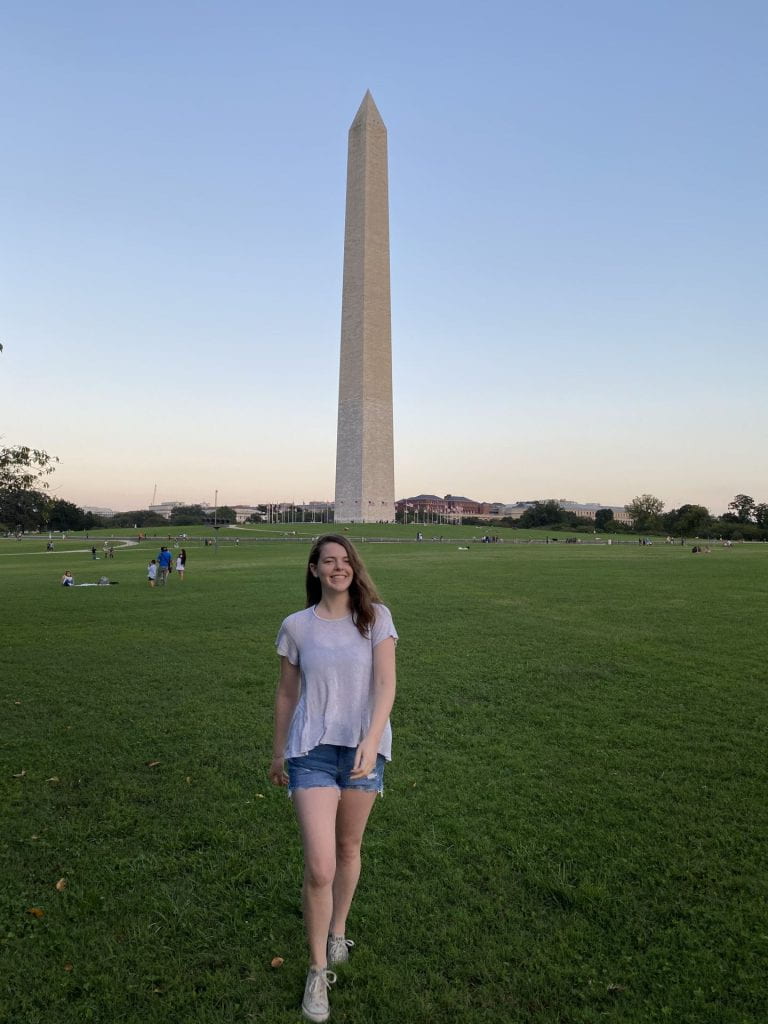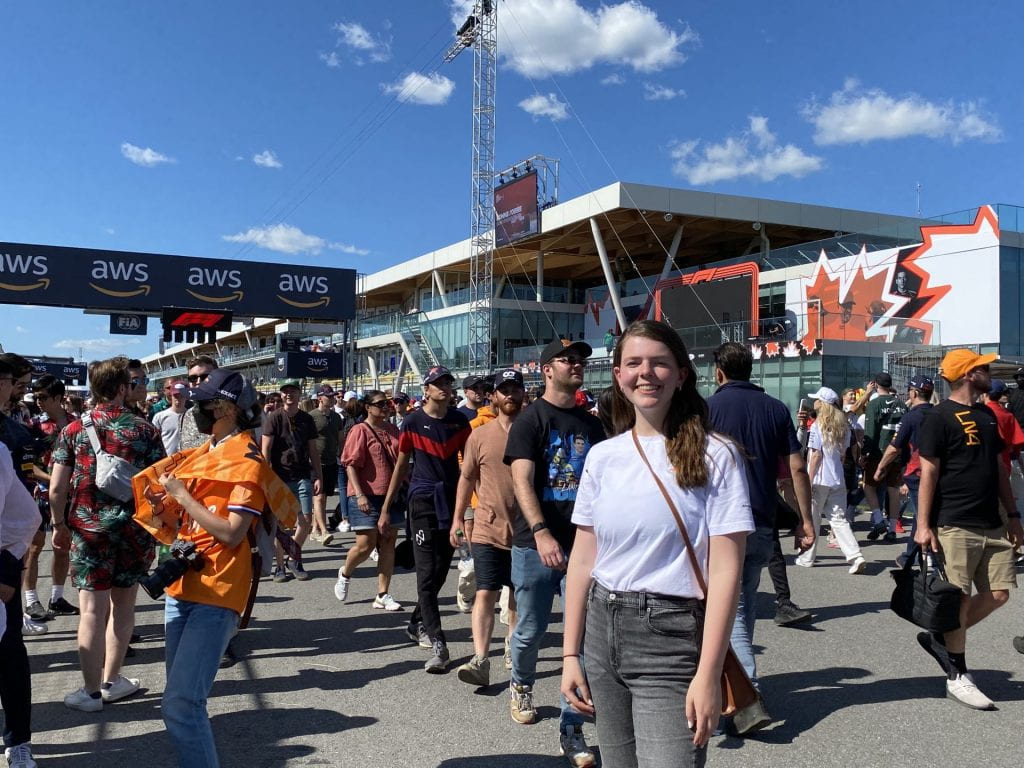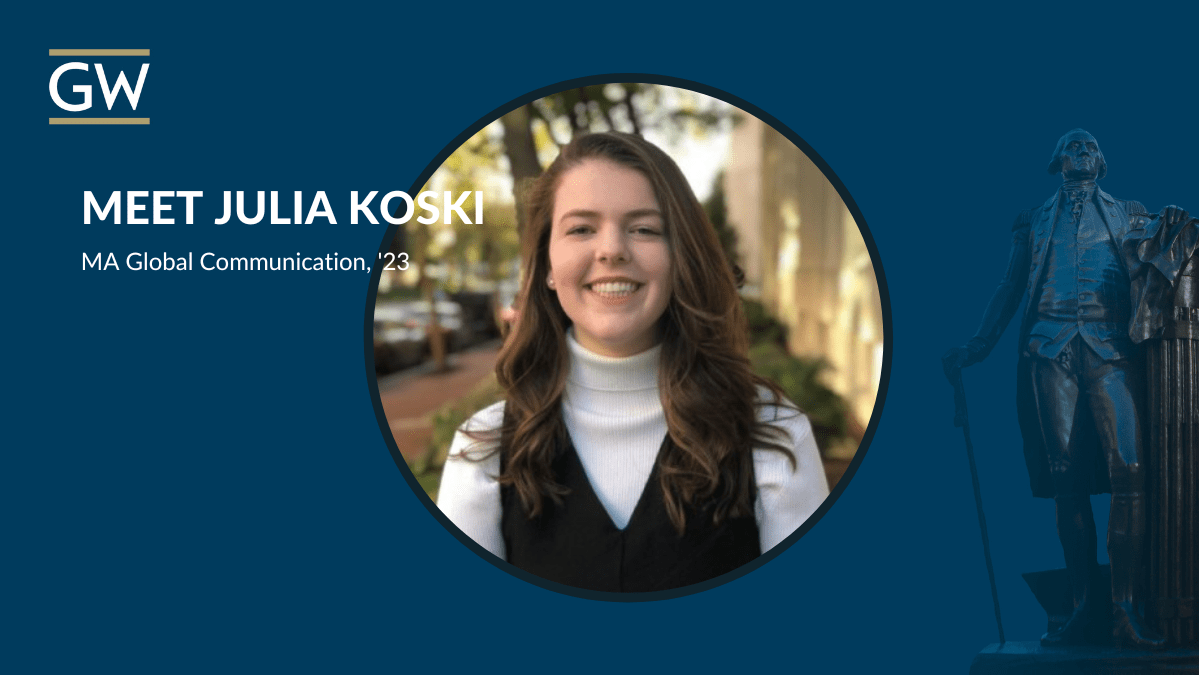By Mohamad Fayaz Yourish, MA Global Communication ’25
1. Can you tell us a bit about your background (where you’re from and/or grew up) and what brought you to GW?
I was born and raised in Ridgewood, NJ, in Northern New Jersey, and initially came to Washington, DC to pursue my undergraduate studies at GW. I earned a double major in International Affairs and French language, literature, and Culture, and during my time at GW, I also had the opportunity to spend a year studying at Sciences Po in Paris, France. This experience ignited my passion for cross-cultural communication and exchange, as I realized the value of understanding different cultures in the field of international affairs. Because I think when I was in my undergrad, I knew I was interested in the international affairs field, but I didn’t know it is so broad. I didn’t know what direction I wanted to take it in so that year of exchange really solidified for me that I wanted to continue to be in a space where I could work on cross-cultural communication projects, or issues to take that into a more professional sphere. After graduating from GW, I worked in public diplomacy programs in DC for several years, which further reinforced my interest in this field. I decided to pursue a graduate program to deepen my academic foundation in public diplomacy, and I knew I wanted to stay in DC to continue working while studying. When I came across the Global Communications program at GW, it seemed like the perfect fit for my professional goals and familiarity with the university as an alumna, so I made the decision to return to GW for my graduate studies.

2. What drew you to pursue a graduate degree in Global Communication?
I sought a specialized degree that would align with my career goals in public diplomacy, rather than a general international affairs degree. I recognized the importance of communication skills in my professional career, as I had not taken any communications courses during my undergraduate studies. So, I was drawn to the Global Communications program, which offered a blend of international affairs and communications coursework in collaboration between the School for Media and Public Affairs and the Elliott School of International Affairs. The practical applications of public diplomacy through different courses and the capstone project were also appealing. Moreover, I appreciated GW’s flexibility in scheduling classes, with options for evening, weekend, and summer classes, which allowed me to continue working while pursuing my degree. It felt like the perfect fit for my career aspirations and lifestyle.
3. How has your experience at GW prepared you for a career in international affairs and public diplomacy?
Throughout this program, I have gained valuable hard skills that I now realize are crucial as I approach graduation. The most significant skill I have developed is strategic development of public diplomacy tools. Prior to this program, I did not have a clear conception of strategy in public diplomacy, but many of the classes have complemented each other in demonstrating how to go from the inception of an idea to implementing strategic change. The focus on strategy development, from setting goals to defining objectives and tactics, has been consistently applied across various courses, and I now consider it the most tangible skill I have gained. The program also emphasized strong writing and critical thinking skills, as we frequently applied what we learned through papers, presentations, and media strategies, which has made me a stronger communications professional. One of my professors Patricia Kabra, always said, “everything communicates,” and I now reflect on this in my job, especially considering the high stakes of public diplomacy. This mindset will continue to guide me in my future career, as public diplomacy is inherently forward-facing, requiring the building of mutual trust and interest with diverse populations. Overall, my takeaway from this program has been immense and will undoubtedly shape my career moving forward.
4. What specific courses or projects have you found most impactful during your Global Communication program?
Several classes stand out in my mind as I reflect on my time in this program. One that comes to mind is “Strategic Political Communication” with Professor Ethan Porter at SPAC. This class fundamentally changed my perspective on how the human mind works in the context of communication. It was intriguing to learn about the psychology behind what motivates people to take action, how to connect with them emotionally, and how to navigate information overload in today’s society. The class equipped me with practical strategies that have been proven to work in various applications.
Another noteworthy class was “Public Diplomacy” with Patricia Kabra. The unique setup of the class, where we played the role of a public diplomacy officer at an embassy of our choice, made it exceptionally practical. Throughout the semester, we worked on deliverables such as speech writing, media strategy, briefings, and a final public diplomacy strategy document using our chosen embassy as a case study. This allowed me to gain practical skills in areas like speech writing, which I had not previously experienced.
Lastly, the capstone course was a standout experience for me. It was impressive how this year-long research project provided us with the opportunity to conduct a deep dive into our chosen topic. The fact that GW funded our capstone with travel money added to the richness of our work and the trip itself was instrumental for producing a strong and accurate report. The interviews we conducted with key stakeholders in Serbia and Belgrade, which we were able to do in person, were invaluable to the accuracy and depth of our report. Our presence there demonstrated our commitment to understanding the topic, which would not have been possible without the support of the capstone office. It was a meaningful and enriching experience to conduct research at the master’s level, and I am grateful for the opportunity.
5. What advice do you have for future students who are interested in pursuing a Global Communication graduate degree? Many people pursue a master’s degree to specialize after completing a more general undergraduate degree. This program focused on public diplomacy and global communication, offers targeted knowledge and skills. However, it’s important to note that this degree is highly applicable in various professional fields. Even if you don’t see yourself as a career public diplomacy officer, the program provides flexibility for diverse career paths. It equips you with strong communication skills that are transferable to public relations, public affairs, exchange programs, and more. It deepens your existing knowledge of communication and international affairs and helps you discover your career interests. The program offers a wide range of elective courses and the director is open to student proposals, making it flexible to suit your individual goals. I would encourage those who are uncertain to connect with program alumni or the director to learn more and explore the possibilities.

Julia was interviewed by first-year graduate student Mohamad Fayaz Yourish. Fayaz is also in the Global Communication program working with IPDGC on student engagement.

